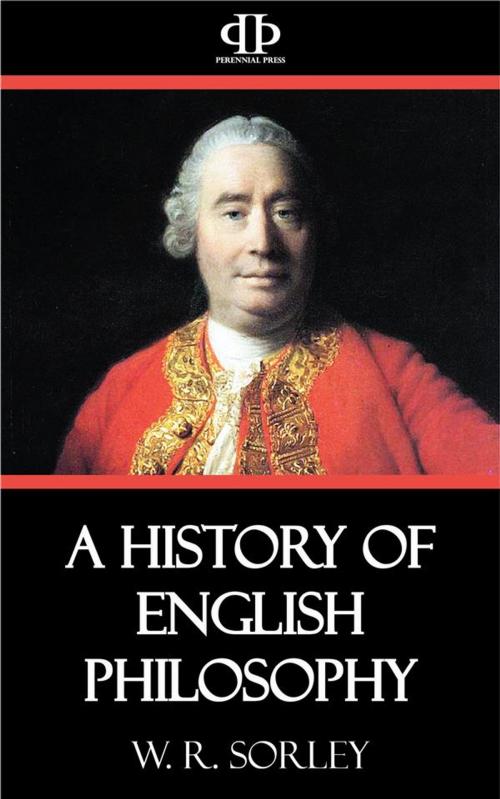A History of English Philosophy
From Francis Bacon to Utilitarianism
Nonfiction, Religion & Spirituality, Philosophy, Modern, Political| Author: | W.R. Sorley | ISBN: | 9781518358739 |
| Publisher: | Perennial Press | Publication: | January 4, 2016 |
| Imprint: | Language: | English |
| Author: | W.R. Sorley |
| ISBN: | 9781518358739 |
| Publisher: | Perennial Press |
| Publication: | January 4, 2016 |
| Imprint: | |
| Language: | English |
THE purpose of this book is to trace the history of philosophy in Great Britain from the time when it began to be written in the English language until the end of the Victorian era. There are two ways of writing the history of philosophy. One of them sets out from the standpoint of philosophy as conceived by the writer; the other from that of the philosophers themselves. On the former method the fundamental problems of philosophy will be presented at the outset, and each step taken towards their definition and solution will then be noted; whatever is irrelevant to the main issue will be left out of sight, however important it may have been in the minds of some of the philosophers. On the latter method the subject will be approached as it appeared to each philosopher in turn, and the presentation of definite concepts and clear issues will emerge gradually as the story progresses. Each of these methods has its own advantages and its own dangers. The former concentrates upon the essential, but it is liable to miss historical proportion by stressing certain features and overlooking others. The latter keeps in close touch with the documents, but care is needed to prevent the meaning of the whole from being obscured by details.
The accounts of English thought contained in the general histories of modern philosophy have, for the most part, followed the former method and the result has often been one-sided and misleading, so that even English readers have been led to misjudge the character of their national philosophy. The other method has been followed in the present treatise. All the leading philosophical writers have been passed under review; they have been studied in their lives and in their books; and an effort has been made to seize and to express what was essential in their contribution to thought.
I am fully aware of the difficulties of the plan, but I have done my best to surmount them. Biographical and bibliographical detail has been introduced, but it has been used to explain and illustrate thought. Minor writers, now seldom read, have been dealt with but only by giving a concise estimate of the contribution which each had to make to the subject; and they have been grouped round the leading representatives of a period or type of thought. These leading writers have been made the central figures in successive chapters of the history. In carrying out this plan the scope of philosophy itself has been understood in the wider sense which most of the writers gave it in their own minds. The boundaries which separate it from theology, economics, and political theory have not been drawn very sharply, or, rather, they have been allowed to become more sharply marked in the course of the history just as they did in the minds of successive thinkers.
THE purpose of this book is to trace the history of philosophy in Great Britain from the time when it began to be written in the English language until the end of the Victorian era. There are two ways of writing the history of philosophy. One of them sets out from the standpoint of philosophy as conceived by the writer; the other from that of the philosophers themselves. On the former method the fundamental problems of philosophy will be presented at the outset, and each step taken towards their definition and solution will then be noted; whatever is irrelevant to the main issue will be left out of sight, however important it may have been in the minds of some of the philosophers. On the latter method the subject will be approached as it appeared to each philosopher in turn, and the presentation of definite concepts and clear issues will emerge gradually as the story progresses. Each of these methods has its own advantages and its own dangers. The former concentrates upon the essential, but it is liable to miss historical proportion by stressing certain features and overlooking others. The latter keeps in close touch with the documents, but care is needed to prevent the meaning of the whole from being obscured by details.
The accounts of English thought contained in the general histories of modern philosophy have, for the most part, followed the former method and the result has often been one-sided and misleading, so that even English readers have been led to misjudge the character of their national philosophy. The other method has been followed in the present treatise. All the leading philosophical writers have been passed under review; they have been studied in their lives and in their books; and an effort has been made to seize and to express what was essential in their contribution to thought.
I am fully aware of the difficulties of the plan, but I have done my best to surmount them. Biographical and bibliographical detail has been introduced, but it has been used to explain and illustrate thought. Minor writers, now seldom read, have been dealt with but only by giving a concise estimate of the contribution which each had to make to the subject; and they have been grouped round the leading representatives of a period or type of thought. These leading writers have been made the central figures in successive chapters of the history. In carrying out this plan the scope of philosophy itself has been understood in the wider sense which most of the writers gave it in their own minds. The boundaries which separate it from theology, economics, and political theory have not been drawn very sharply, or, rather, they have been allowed to become more sharply marked in the course of the history just as they did in the minds of successive thinkers.















